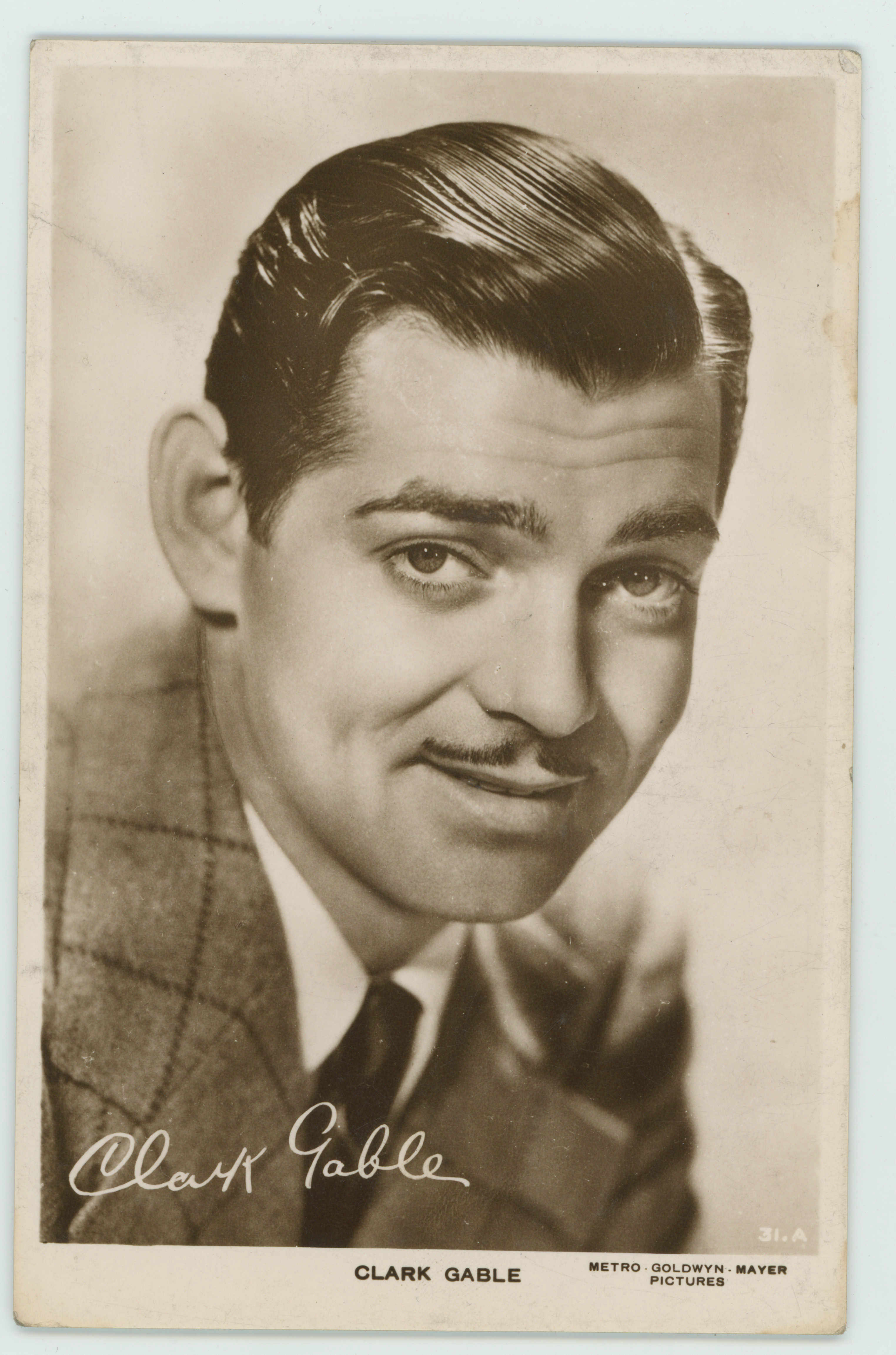Irene Dennerley (ID-95-031)

Post card of Clark Gable donated to CCINTB (JB-22-001PC017)
In February 1995, Irene Dennerley contacted Cinema Culture in 1930s Britain in response to an appeal in the local press, and joined the twenty-two individuals living in the Greater Manchester area who were interviewed for the project as core informants during the summer of that year. Born in Warrington in 1918, Mrs Dennerley was one of eight children; her father, whose family migrated to England in the late nineteenth century,1 was a waterproof garment maker. Her mother, a housewife, was born in Manchester. On leaving school at the age of fourteen Mrs Dennerley took up employment in a waterproof garment factory. During World War Two she worked in light munitions manufacture, and was later employed for some years at Heathlands Retirement Home. Mrs Dennerley was interviewed on 1 May and 12 June 1995 at her home in Prestwich, both interviews being of interest for what they reveal about Manchester’s experience of the Second World War as well as about the geography of Jewish Manchester.
Much of Mrs Dennerley’s first interview, which took place close in time to the nationwide commemoration of the 50th anniversary of VE Day, is taken up with details of her family background and memories of the war years, including her work in munitions, the Manchester Blitz, and her wartime leisure activities. Encouraged to talk about her cinemagoing, she names and locates a number of cinemas close to where she lived as a child, recalls dressing up to go to the more luxurious cinemas in the city centre as she grew older, and confesses to a liking for romantic films and ‘nice’ adventure pictures. She volunteers that her favourite film star was Clark Gable, and when prompted names some other stars that she liked. Recounting close encounters with wartime bombing raids over the city and noting that she took care to let her father know where she would be going on a night out, she concludes: “We did have a nice time, but there were nights when you didn’t know if you’d be alive in the morning.” Notwithstanding the interviewer’s tactful efforts at redirection, most of Mrs Dennerley’s second interview again covers non-cinemagoing related topics. It opens with an account of her recent local shopping trips and the difficulties she faces in getting about because of her corns. Asked about her memories of the Ice Palace, which had been referred to in the first interview, she describes its location, how to get there by bus, and how the area has changed in recent years. She recalls that the venue hosted live shows in winter and that in summer the rink was converted into a cinema auditorium. Reverting to memories of her wartime years, Mrs Dennerley implies that she enjoyed male company and admits that she was a flirt—though “never intimate with any fellas”. The new dances she learned from the US servicemen stationed nearby were different, she says, from the ones in the Astaire/Rogers musicals she had previously enjoyed; and, on the subject of musicals, she offers a detailed account of recent coach trips to London to see stage shows. About her earlier cinemagoing, she mentions the leaflets produced by cinemas announcing coming attractions and refers to Laurel and Hardy and Chaplin, noting that she probably wouldn’t find them funny today. On clothes in films, she says that men and women onscreen always looked elegant and smart, and that she herself liked to dress well--she recalls buying dress fabric and garment samples at discount from local businesses. Conversation reverts to Clark Gable’s charms, and (prompted by the interviewer) to the qualities of several other stars. The interview closes with memories of a dalliance with a workmate at the munitions factory (“just a good friend”, she insists), who stayed in her mind after her husband’s death many years later.1While Mrs Dennerley’s recollection is that her father was born outside the United Kingdom, UK Census records have it that he was born in Manchester in 1893, and that his parents and older siblings had migrated from “Kiev, Russia”. Mrs Dennerley’s maiden name of Moss is an Anglicisation of Moshensky.
Interview transcript | Listing of cinemas, films and stars mentioned
Audio-synced interview (2 of 2)
Interview transcript | Listing of cinemas, films and stars mentioned
Documents, Memorabilia and Related Links
Greater Manchester home pageEntry on Michael Fidler, waterproof garment manufacturer (snaccooperative.org)
'Terrible waste of a brain!' (News & Blog area)
Publication relating to Irene Dennerley's interview:
Levitt, S. (1986). 'Manchester mackintoshes: a history of the rubberized garment trade in Manchester'. Textile History 17(1).